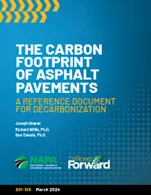LCE4ROADS is a new certificate assessing sustainability during road construction and rehabilitation
Statistics have just been released showing that 2016 was the hottest year in history and reinforcing the concern that climate change is starting to have a real impact on our society.
Adaptation to climate change is becoming an ever growing priority for the road infrastructure sector which is looking for new ways to conduct its construction and maintenance operations in a more environmentally friendly ma
March 28, 2017
Read time: 4 mins
LCE4ROADS is a new certificate assessing sustainability during road construction and rehabilitation
Statistics have just been released showing that 2016 was the hottest year in history and reinforcing the concern that climate change is starting to have a real impact on our society.
Adaptation to climate change is becoming an ever growing priority for the road infrastructure sector which is looking for new ways to conduct its construction and maintenance operations in a more environmentally friendly manner.
The new EU rules of Public Procurement (Directive 2014/25/EU), transposed into national legislation by Member States in 2016, provide for the first time a framework that can facilitate the development of more innovative and sustainable tenders in the transport sector, including road infrastructure.
As in other sectors, sustainable certifications (i.e. ecolabels) identify products and services that contribute to achieve greener results because they have demonstrated a reduced environmental impact throughout their life cycle. Although there are more than 17,000 eco-labelled products on the market, no specific reference for road products and infrastructures exists at the moment.
Experience has shown that labelling initiatives promote smart procurement by stimulating industry to invest in innovation and hence become more competitive. In this sense, the promotion of certificates assessing the sustainability impact during construction and rehabilitation of roads could be used by road authorities to achieve greener goals throughout tendering processes in order to better tackle current environmental challenges (GHG emission, energy consumption, raw materials or water use, etc).
In this regard, the European Union has co-financed the collaborative research LCE4ROADS project to achieve those goals by facilitating the creation of a new methodology and certificate which have been recently unveiled after three years of research.
LCE4ROADS lays down the foundations for a EU-harmonised certification system that integrates the four criteria under the Life Cycle Engineering Approach (LCE) to assess the sustainability performance of road construction: social, economic, technical and environmental. The consortium wanted, from the very beginning, to receive inputs from external stakeholders in order to achieve the highest consensus possible in the sector when defining the methodology. These stakeholders included national and European players including the European Commission’s Joint Research Centre.
In this sense, several workshops and consultation rounds were organised with road experts to identify which could be the most suitable KPIs to be included in the sustainability assessment of roads. These KPIs can be taken on a voluntary basis by road authorities.
During the elaboration of the LCE4ROADS certificate, partners exchanged knowledge and practical experiences with those external stakeholders in order to achieve, by common agreement, the final list of indicators. In total, 25 key performance indicators were identified, discussed and incorporated into the new LCE4ROADS methodology. In addition, the consortium, taking comments from the workshops, has also set the following boundary conditions for the LCE4ROADS certificate:
• European-wide certification approach (EU and neighbouring countries)
• Focus only on pavements both for asphalt and concrete (excluding other road elements)
• Flexibility and availability to adapt to regional peculiarities and regulations
• Suited for inclusion in public procurement practices complementing the new directive and GPP criteria
• Four-domain approach (i.e. environmental, social, economic and technical)
• Inclusion of a list with a minimum number of voluntary KPIs in each domain
• Two certificates (light and complete) to be awarded depending on the number of mandatory KPIs required
• Rejection limits for the achievement of the LCE4ROADS certification will be set by the procurer (which at the least will follow national standards, in they exist, for a specific KPI) and not prescribed by the LCE4ROADS method
• A scoring process will be set by the procurer and not by the LCE4ROADS method.
The reliability of the LCE4ROADS methodology has been validated by numerous initial tests for asphalt and concrete materials in various laboratories and research centres. These tests have helped the consortium to optimise the methodology and software (i.e. functioning, requirements, layout) and paved the way for the final deployment in three real road projects in Turkey, Poland and Spain for both concrete and asphalt pavements.
The final version of the methodology was presented in Brussels last November where representatives from the European Commission, road administrations and industry discussed how to best promote the new certificate in Europe.
• Further information about the project is available at %$Linker:2 External <?xml version="1.0" encoding="utf-16"?><dictionary /> 0 0 0 oLinkExternal www.ecolabelproject.eu Visit www.ecolabelproject.eu website false http://www.ecolabelproject.eu/ false false %>
Statistics have just been released showing that 2016 was the hottest year in history and reinforcing the concern that climate change is starting to have a real impact on our society.
Adaptation to climate change is becoming an ever growing priority for the road infrastructure sector which is looking for new ways to conduct its construction and maintenance operations in a more environmentally friendly manner.
The new EU rules of Public Procurement (Directive 2014/25/EU), transposed into national legislation by Member States in 2016, provide for the first time a framework that can facilitate the development of more innovative and sustainable tenders in the transport sector, including road infrastructure.
As in other sectors, sustainable certifications (i.e. ecolabels) identify products and services that contribute to achieve greener results because they have demonstrated a reduced environmental impact throughout their life cycle. Although there are more than 17,000 eco-labelled products on the market, no specific reference for road products and infrastructures exists at the moment.
Experience has shown that labelling initiatives promote smart procurement by stimulating industry to invest in innovation and hence become more competitive. In this sense, the promotion of certificates assessing the sustainability impact during construction and rehabilitation of roads could be used by road authorities to achieve greener goals throughout tendering processes in order to better tackle current environmental challenges (GHG emission, energy consumption, raw materials or water use, etc).
In this regard, the European Union has co-financed the collaborative research LCE4ROADS project to achieve those goals by facilitating the creation of a new methodology and certificate which have been recently unveiled after three years of research.
LCE4ROADS lays down the foundations for a EU-harmonised certification system that integrates the four criteria under the Life Cycle Engineering Approach (LCE) to assess the sustainability performance of road construction: social, economic, technical and environmental. The consortium wanted, from the very beginning, to receive inputs from external stakeholders in order to achieve the highest consensus possible in the sector when defining the methodology. These stakeholders included national and European players including the European Commission’s Joint Research Centre.
In this sense, several workshops and consultation rounds were organised with road experts to identify which could be the most suitable KPIs to be included in the sustainability assessment of roads. These KPIs can be taken on a voluntary basis by road authorities.
During the elaboration of the LCE4ROADS certificate, partners exchanged knowledge and practical experiences with those external stakeholders in order to achieve, by common agreement, the final list of indicators. In total, 25 key performance indicators were identified, discussed and incorporated into the new LCE4ROADS methodology. In addition, the consortium, taking comments from the workshops, has also set the following boundary conditions for the LCE4ROADS certificate:
• European-wide certification approach (EU and neighbouring countries)
• Focus only on pavements both for asphalt and concrete (excluding other road elements)
• Flexibility and availability to adapt to regional peculiarities and regulations
• Suited for inclusion in public procurement practices complementing the new directive and GPP criteria
• Four-domain approach (i.e. environmental, social, economic and technical)
• Inclusion of a list with a minimum number of voluntary KPIs in each domain
• Two certificates (light and complete) to be awarded depending on the number of mandatory KPIs required
• Rejection limits for the achievement of the LCE4ROADS certification will be set by the procurer (which at the least will follow national standards, in they exist, for a specific KPI) and not prescribed by the LCE4ROADS method
• A scoring process will be set by the procurer and not by the LCE4ROADS method.
The reliability of the LCE4ROADS methodology has been validated by numerous initial tests for asphalt and concrete materials in various laboratories and research centres. These tests have helped the consortium to optimise the methodology and software (i.e. functioning, requirements, layout) and paved the way for the final deployment in three real road projects in Turkey, Poland and Spain for both concrete and asphalt pavements.
The final version of the methodology was presented in Brussels last November where representatives from the European Commission, road administrations and industry discussed how to best promote the new certificate in Europe.
• Further information about the project is available at %$Linker:








